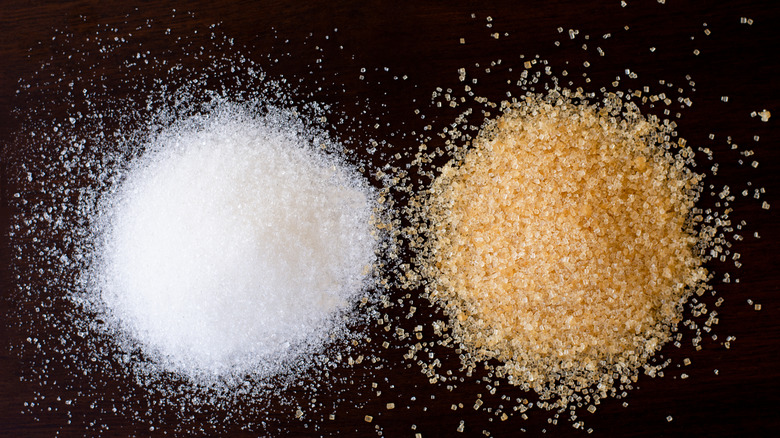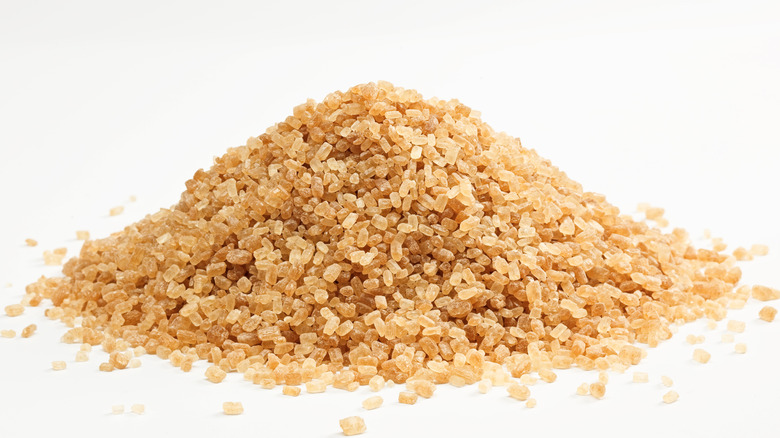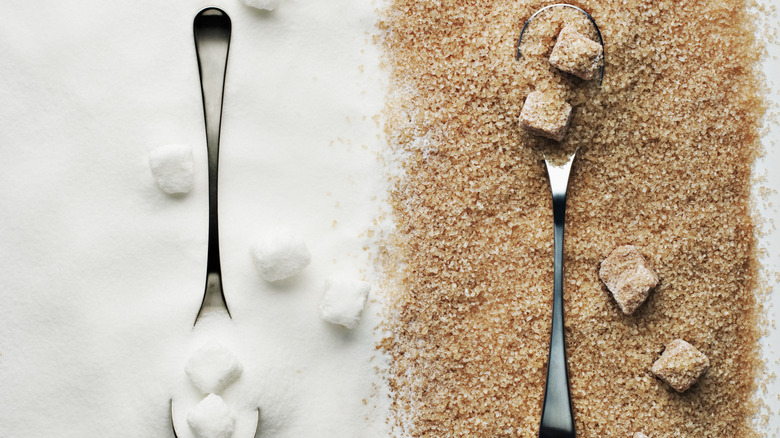Demerara Sugar Vs. Granulated: What's The Difference?
Sugar is undoubtedly one of the most crucial ingredients for bakers. But even the most avid home baker might find the sheer number of types of sugar available to be overwhelming. From icing sugar and coarse sugar to sanding sugar and superfine sugar, there are tons of options that each have their own perfect place and use in all kinds of baked goods. But if you are looking to branch out or came across a recipe that calls for Demerara sugar, and you are not familiar with it, then you might wonder how it stacks up to granulated sugar.
Though granulated sugar has been made from sugar beets and sugar cane since ancient times (via Delighted Cooking), Demerara sugar comes from one particular place. According to Master Class, Demerara sugar is actually the namesake sugar of Demerara, a former British colony. Modern-day Demerara is actually Guyana, which borders Venezuela in South America. Though Demerara sugar is also made from sugar cane, it has quite a lot of differences when compared to white or granulated sugar.
How Demerara sugar is made
Because Demerara sugar comes from a former British colony, it's no surprise that it is a more prevalent and popular type of raw sugar in the United Kingdom than it is in the United States (via My Baking Addiction). Demerara sugar is often used to top dishes and baked goods as well as used in hot beverages thanks to both its texture and flavor profile. According to Master Class, this raw sugar is made up of larger sugar crystals, which means it has more of a crunch to it than granulated sugar. That is because granulated sugar is made up of smaller sugar crystals. Demerara sugar is also known for its caramel and toffee-like flavor thanks to the amount of molasses that remains in the sugar crystals.
Unlike granulated sugar, Demerara sugar is not as processed or refined. For this reason, it is considered to be raw sugar. To make this type of sugar, Guyana sugar cane is soaked in water or crushed until the plant cells containing the sugar are exposed. The plant is then left to dry in the sun for the moisture to evaporate away leaving the sugar crystals behind. This is when the Demerara sugar can be collected (per Healthline).
Because it is a more natural type of sugar, Demerara contains more vitamins and minerals than granulated sugar, which is pure sucrose. You'll find calcium, iron, magnesium, and B vitamins in the raw sugar source (via Healthline).
How granulated sugar is different
Granulated sugar has had all of the naturally-occurring vitamins, minerals, and molasses removed in the refining process. Because the impurities of granulated sugar have been removed, it is pure sucrose — a combination of fructose and glucose (via Master Class). Without these additional compounds, the flavor profile of granulated sugar is muted compared to Demerara sugar. White sugar is sweet, but it doesn't have the caramelized flavors of Demerara sugar. Another difference is that the size of the granulated sugar crystals tends to be smaller.
All of these characteristics of granulated sugar are the result of the processing. According to Delighted Cooking, granulated sugar is the product of affination. This method of making white sugar calls for the sugar crystals to be dissolved in water and a type of phosphorous compound to create a viscous syrup. The syrup is then boiled and cooled so that the sugar crystallizes again after the molasses has separated out of the formerly raw crystals. Next, the sugar is refined — where a centrifuge is used to spin the sugar crystals until the pressure forces the molasses out (via Master Class).
This is how you can substitute the two types of sugar
If you find that you need to substitute either granulated sugar or Demerara sugar for the other, rest assured, it is an easy swap. According to My Frugal Home, Demerara and granulated sugar can be substituted using a one-to-one ratio. Therefore, if the recipe calls for half a cup of granulated sugar, you can use a half cup of Demerara sugar instead.
Another consideration when substituting these two types of sugar is the texture of each. Because white sugar has smaller crystals than Demerara sugar, it dissolves more easily and will have a smoother texture. Demerara's larger crystals are more noticeable and will likely add a bit of crunchy texture to your recipe. It's a good idea to grind the larger crystals down to mimic refined sugar, which ensures the texture of your baked goods will be unchanged (per My Frugal Home).
While both types of sugar can certainly sweeten your coffee or a pan of muffins, each one will lend a different flavor (via Master Class). So, it is important to consider how your recipe will be affected by either a neutral flavor from granulated or a more caramelized one from Demerara sugar. In fact, if you need to substitute another sugar for Demerara and have brown sugar on hand, it will be a closer match than granulated sugar. Nonetheless, Demerara sugar can also take the place of granulated sugar even though it will create a different flavor profile in your baked goods.



